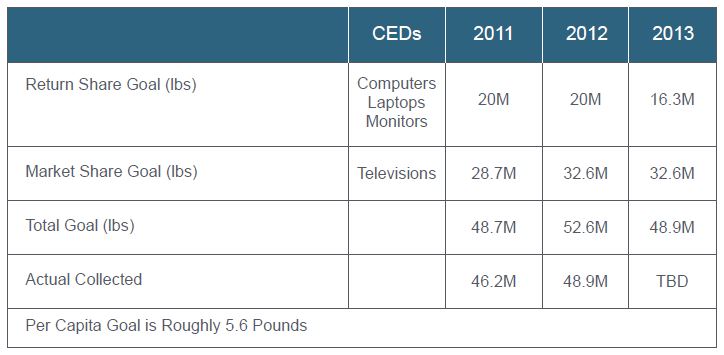 On September 23 the New Jersey Department of Environmental Protection (NJDEP) hosted an informative session for stakeholders impacted by the state’s Electronic Waste Management Act (EWMA) to learn about results achieved under the law to date and discuss issues of concern.
On September 23 the New Jersey Department of Environmental Protection (NJDEP) hosted an informative session for stakeholders impacted by the state’s Electronic Waste Management Act (EWMA) to learn about results achieved under the law to date and discuss issues of concern.
Implemented in January 2011, the EWMA requires manufacturers that sell computers, laptops, computer monitors, and televisions (covered electronic devices or CEDs) in New Jersey, to provide some type of no-cost collection and recycling option to residents and businesses with 50 or fewer employees. Affected manufacturers are given annual minimum weight collection requirements based on sales or return share. If the collection obligation is not met, manufacturers risk facing enforcement actions. Annual registration and submission of a collection plan with the NJDEP is also required and a landfill ban was implemented in January 2011 prohibiting residents and small businesses from placing CEDs in the trash.
When comparing the number of collection points and the amount of material collected from 2010 – before the law was in place – to data from 2012 – two years into the regulations – data uncovers that the amount of collection sites almost tripled and volumes collected were almost eight-times higher since law implementation. A survey conducted in 2009 by the Association of New Jersey Recyclers, of county electronics recycling programs found in 2008 there were 204 collection points sponsored by New Jersey counties or municipalities and roughly 5.5 million pounds of covered electronic devices were collected from the public. As of 2012, there were over 800 collection points available to consumers and 48.1 million pounds (roughly 5.6 pounds per capita) of covered electronic devices collected. At the meeting, the NJDEP stated that roughly 600 (75%) of the over 800 collection points are run by either counties or municipalities.
More information on annual manufacturer goals and program results are below.
The demand – on behalf of manufacturers – to meet their collection goals, has enabled counties and municipalities to have the financial capacity and resources to provide e-waste collection points that can accept a wider array of devices than ever before. This new opportunity helped broaden the previous electronics collection program to residents with no external cost. In some cases this program was able to provide a small amount of revenue to the county or municipality.
While the law appears to successfully serve its intended purpose, a number of county representatives among others expressed concerns about current and potential issues. These included:
- Stability of Collection Service – some municipal and/or county collection sites, who received free collection services of CEDs through an OEM-sponsored recycler in the first year of the law, have had difficulty arranging these same services in the third year of the law or saw a drop in revenue they were generating for CEDs collected. County representatives have expressed concerns about incurring collection costs in future years and wanting to provide a service to their residents, but not necessarily being compensated for their activities by manufactures. Walter Alcorn from the Consumer Electronics Association countered that the law was a shared responsibility law and manufacturers are not fully responsible for making the law work. Guy Watson of the NJDEP stated that the majority of municipal and county recyclers were paying for electronics recycling service three years ago and the state is now at the point where most are receiving it for free or receiving revenue and felt the market would stabilize itself as time progressed.
- Scavenging – although a landfill ban went into effect in 2011, a lack of public education at the local level has many residents across the state still putting electronics at the curb for disposal. Scavenging of metals (largely from televisions left at the curb) has left local governments to deal with illegal dumping in rural and urban areas. A few county representatives blamed the ability of scavengers to easily sell these items at scrap metal yards as the root of the problem. Watson of the NJDEP stated that his department has no ability to monitor what is accepted at scrap metal yards and this falls under the purview of the New Jersey Attorney General’s office. It was also noted that a number of municipalities across the state were still doing curbside pickup of electronics only. After some discussion, the NJDEP agreed to send a letter to all New Jersey mayors requesting that their towns stop providing curbside pickup.
- More Transparency of OEM and Program Performance – county representatives requested that the NJDEP post more information on their website about actual manufacturer obligations and performance and compliance with annual registration and reporting. The NJDEP responded stating they would attempt to make updates to their website more frequently.

